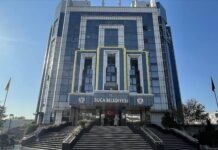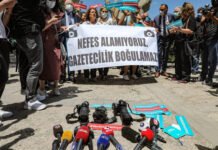Working with pen and paper and cut off from the outside world, Turkish Professor Ali Kaya who was jailed over his alleged links to the Gülen movement, wrote three papers, re-deriving physical formulas from scratch. According to a report by Nature International Journal of Science, after his release, Kaya posted the papers on the preprint server arXiv.
Thousands of academics in Turkish universities stand accused of either having supported terrorism or the attempted coup against Turkish autocratic President Recep Tayyip Erdoğan in July 2016. Theoretical physicist Ali Kaya is one of them. He was arrested three months after the failed coup and held for 15 months before his trial took place. On December 20, 2017, an İstanbul court declared him guilty of being a member of a “terrorist organisation” and sentenced him to six years of imprisonment, but released him early owing to the time he had already served in prison while awaiting trial.
According to another report by Times Higher Education, three theoretical physics papers published on January 2018 by Professor Kaya with an unusual acknowledgement. “This work, which has been done…without any possibility of using references, is dedicated to my friends at rooms C-1 and E-10 who made my stay bearable at hell for 440 days between 7.10.2016 and 20.12.2017. I am also indebted to the colleagues who show support in these difficult times,” writes Ali Kaya, a professor at Boğaziçi University in İstanbul.
According to the report, Professor Kaya, imprisoned on terrorism charges following the controversial military coup attempt on July 15, 2016 and subsequent government crackdown against academics, said that he wrote the papers in total isolation from outside scholarship using just a pen and paper. Access to a computer and the internet in jail were “out of the question”, he told Times Higher Education. “They isolated us from the rest of the world.”
During his nearly 15-month imprisonment in notorious Silivri Prison in İstanbul, even specialist physics books or papers were banned, despite a request from his lawyer. Professor Kaya’s PhD student unsuccessfully tried to send in physics papers, but they were rejected for not being in Turkish, he explained. She tried resending them after translating them into Turkish using Google Translate, but they were still rejected. “I couldn’t get anything about physics,” he recalled.
But “the beauty of theoretical physics” is that “to do research, you only need paper and pen”, he said. Deprived of previous scholarship, he had to reinvent the wheel, re-deriving complex formulas from simpler physics principles, he explained. It was a “headache”, he said, but “at the end of the day, I think I got good results”.
The journal has reported that Professor Kaya worked in an unexpectedly academic environment. Professor Kaya’s prison dormitory, about 140 metres square, with a yard half as big, and 10-metre-high walls, he recalled – was shared with about 20 other highly educated prisoners who the authorities had decided to keep together, he said. “The majority of them were university graduates,” and included academics, teachers and a doctor, he explained.
“From time to time we gathered to drink tea and discuss quantum physics, relativity, black holes, the Big Bang and science and religion issues,” he said. But “mentally I was not in a very comfortable situation” and racked with worry about his family and children, he stressed. Asked why he kept up his work inside, he said: “You need to do something, or time doesn’t pass in prison.”
According to the report, Professor Kaya was reluctant to speak about the details of the case against him, but said that he was charged with supporting the Gülen movement. The evidence presented against him was “absurd,” he said, and included academic visits to seminars in the US and a sabbatical based at McGill University in Canada. After the coup attempt, “suddenly I become a terrorist according to the state”, he said.
Although he has now been released, he said that his future at Boğaziçi is “not clear yet” and is still fighting a legal battle against his sentence, which was only partially served. Depending on the outcome, he could have to return to jail for another 15 months.
Professor Kaya has also gave an interview to Nature International Journal of Science on January 30, 2016 and stated that while in prison, he kept his sanity by continuing his work on fundamental topics in cosmology. “Of course there was no Internet. Nothing digital — not even a pocket calculator — was allowed… I worked up the research ideas I had already in my head before my arrest. Of course, it took much longer than it would have done if I had been at my computer. I had to start from basic formulae and derive things myself. But time is something you have plenty of in prison. OK, I could not do ground-breaking work, but I think the papers I produced are solid, and I expect to get them published in good journals,” said Kaya.
Talking about the prison conditions Kaya stated that “Probably the conditions were better than in some other prisons in Turkey. Prisoners came and went. At times there were as many as 30 people, but on average, there were around 20 of us in 140 square metres. The space was divided into several small rooms for sleeping and a larger area that had a television. We were allowed into an adjacent small yard during the day.”
“It sounds cool to say you did research in prison, but prison is a bad place and I wouldn’t recommend it! The worst thing was the lack of contact. We were only allowed family visits for one hour a week, usually speaking through a glass partition on the telephone. We were also allowed a ten-minute phone call every two weeks. And I could speak to my lawyer once a week. The first night in jail was the worst time of my life. I never gave up hope, but in prison you do often get a feeling that you might never get out, and nights are the worst.But I told myself ‘They can take my freedom, but they can’t keep me from doing physics.’,” added Professor Kaya.
Anyway, he said “I was fortunate in my cellmates, many of whom were facing similar charges to me. Many were teachers. There was another assistant professor, and a doctor. We all got on well and the atmosphere was peaceful and respectful. I could sit at a little table with pen and paper and do my work.”
Turkey survived a controversial military coup attempt on July 15, 2016 that killed 249 people. Immediately after the putsch, the Justice and Development Party (AKP) government along with Turkish autocratic President Recep Tayyip Erdoğan pinned the blame on the Gülen movement.
Gülen, who inspired the movement, strongly denied having any role in the failed coup and called for an international investigation into it, but President Erdoğan — calling the coup attempt “a gift from God” — and the government initiated a widespread purge aimed at cleansing sympathizers of the movement from within state institutions, dehumanizing its popular figures and putting them in custody.
Turkey has suspended or dismissed more than 150,000 judges, teachers, police and civil servants since July 15. Turkey’s Interior Minister announced on December 12, 2017 that 55,665 people have been arrested. Previously, on December 13, 2017, The Justice Ministry announced that 169,013 people have been the subject of legal proceedings on coup charges since the failed coup.
A total of 48,305 people were arrested by courts across Turkey in 2017 over their alleged links to the Gülen movement, said Turkish Interior Minister Süleyman Soylu on Dec. 2, 2018. “The number of detentions is nearly three times higher,” Soylu told a security meeting in İstanbul and claimed that “Even these figures are not enough to reveal the severity of the issue.”















